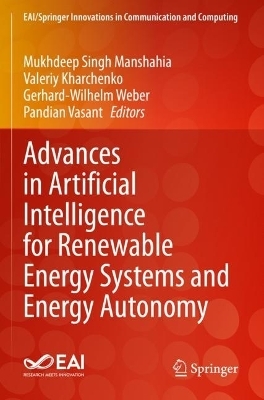
Advances in Artificial Intelligence for Renewable Energy Systems and Energy Autonomy
Springer International Publishing (Verlag)
978-3-031-26498-6 (ISBN)
Mukhdeep Singh Manshahia, Ph.D., is an Assistant Professor at Punjabi University Patiala, Punjab, India. He obtained his Ph.D. in 2016 from Punjabi University Patiala. He works in Sustainable Computing, Artificial Intelligence, Wireless Sensor Networks, the Internet of Things (IoT), Nature Inspired Computing, Energy Harvesting, and Renewable Energy Systems. He has edited three books, published 46 international and national research papers, and presented 30 research papers at international and national conferences/seminars. He has guided four Master dissertations, 55 undergraduate projects, and two Ph.D. dissertations. He has 17 years of working experience at universities. He is a reviewer for many WoS journals and is a member of the Computer Society of India, IEEE, and IAENG.
Valeriy Kharchenko, Ph.D., is Chief Scientific Officer at FSBSI Federal Scientific Agroengineering Center VIM, Moscow. He is a researcher and consultant in a wide range of energy-saving fields, including energy policy at the national and international levels, energy RTD strategy, RUE, and RES. Dr. Kharchenko's education includes Tacis Training Programme (Manager in Energy,1994-1995); Tashkent State Technical University, Uzbekistan (Professor, 1994); State Higher Training Courses on Patenting and Invention (Certificate with Distinction, 1987); Institute of Electronics, Moscow (Doctor of Engineering Sciences Degree, 1987); Institute of Inorganic Chemistry, Novosibirsk (Candidate of Chemistry Degree, 1969); Tashkent Polytechnic Institute ( echnology Engineer, 1956-1961). His international activity includes counterpart expert in the Project of EU "Monitoring and evaluation of the energy (nonnuclear) projects implementation in Uzbekistan" (carried out by European companies, 1994-1996); expert for evaluation of submitted proposals INTAS (1998-2000); senior expert of the Central Asia Energy Advisory Group (a project under the EC DG XVII's SYNERGY Programme) with responsibilityfor the formation of expert groups, peering and estimation of their reports, and preparing general Interim and final annual reports (1996-2000); Global Environmental Facility, Government of Uzbekistan (Joint Project UZB/98/G42/A/1G/99), an expert at the premises (2000-2001 UNDP). He is a reviewer for several international journals, including Solar Energy, Deputy Editor-in-Chief of the European Journal of Renewable Energy, member of the editorial boards of several international journals, including the International Journal of Energy Optimization and Engineering (IJEOE) and the Journal of Cases on Information Technology (JCIT), and an honorary professor of the Institute of Hydropower and Renewable Energy of the National Research University.
Gerhard-Wilhelm Weber, Ph.D., is a Professor with the Faculty of Engineering Management at Poznan University of Technology, Poznan, Poland. His research is on mathematics, statistics, operational research, data science, machine learning, finance, economics, optimization, optimal control, management, neuro-, bio-, and earth sciences, medicine, logistics, development, cosmology, and generalized space-time research. He is involved in the organization of scientific life internationally. He received a Diploma and Doctorate in Mathematics and Economics/ Business Administration at RWTH Aachen and Habilitation at TU Darmstadt. He replaced Professorships at the University of Cologne, and TU Chemnitz, Germany. He was a Professor in Financial Mathematics and Scientific Computing and Assistant to the Director at the Institute of Applied Mathematics, Middle East Technical University (METU), Ankara, Turkey. He has been a member of five other graduate schools, institutes, and departments at METU. Dr. Weber also has affiliations at the University of Siegen (Germany), Federation University (Ballarat, Australia), University of Aveiro (Portugal), University of North Sumatra (Medan, Indonesia), MalaysiaUn
Chapter 1. General Approaches to Assessing Electrical Load of Agro-Industrial Complex Facilities When Justifying the Parameters of the Photovoltaic Power System.- Chapter 2. RBFNN for MPPT Controller in Wind Energy Harvesting System.- Chapter 3. Simulation Optimum Performance All-Wheels Plug-In Hybrid Electric Vehicle.- Chapter 4. Artificial Intelligence application to flexibility provision in energy management system: a survey.- Chapter 5. Machine Learning Applications for Renewable Energy Systems.- Chapter 6. New Technologies and Equipment For Smelting Technical Silicon.- Chapter 7. Reconfiguration of distribution network considering photovoltaic system placement based on metaheuristic algorithms.- Chapter 8. Technology of Secondary Cast Polycrystalline Silicon And Its Application In The Production Of Solar Cells.- Chapter 9. Machine Learning Applications for Renewable based Energy Systems.- Chapter 10. Bi-Objective Optimal Scheduling of Smart Homes Appliances using Artificial Intelligence.- Chapter 11. Optimal placement of photovoltaic systems and wind turbines in distribution systems by using Northern Goshawk Optimization algorithm.- Chapter 12. Granulated silicon and thermal energy converters on its basis.- Chapter 13. Security Constrained Unit Commitment with Wind Energy Resource using Universal Generating Function.
| Erscheinungsdatum | 18.06.2024 |
|---|---|
| Reihe/Serie | EAI/Springer Innovations in Communication and Computing |
| Zusatzinfo | XXII, 285 p. 116 illus., 90 illus. in color. |
| Verlagsort | Cham |
| Sprache | englisch |
| Maße | 155 x 235 mm |
| Themenwelt | Informatik ► Theorie / Studium ► Künstliche Intelligenz / Robotik |
| Technik ► Elektrotechnik / Energietechnik | |
| Schlagworte | Artificial Intelligence • Bio fuels • Clean Energy • Deep learning • deep neural networks • Hydrogen Energy • hydro power • machine learning • Power Systems • renewable energy • Smart computing • Soft Computing • Solar power |
| ISBN-10 | 3-031-26498-3 / 3031264983 |
| ISBN-13 | 978-3-031-26498-6 / 9783031264986 |
| Zustand | Neuware |
| Haben Sie eine Frage zum Produkt? |
aus dem Bereich


